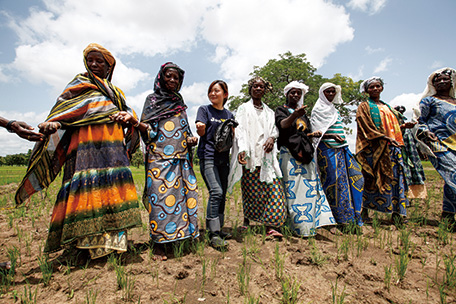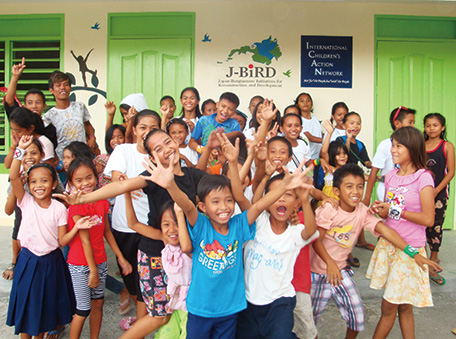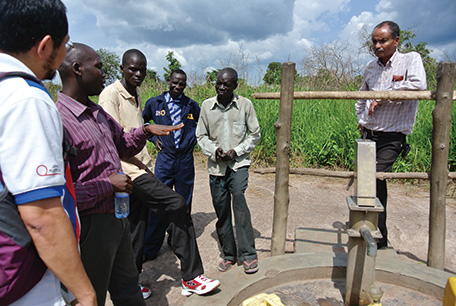Japan's Official Development Assistance White Paper 2012
Part I International Cooperation – Moving Forward and Growing Together
Chapter 1 ODA for Moving Forward Together

JOCV member fertilizing rice plants with farmers in Burkina Faso (rice cropping, edible crops sector). Providing technical guidance to agricultural extension workers and rice-growing farmers, efforts are made toward poverty reduction by increasing rice yields. (Photo: Akio Iizuka/JICA)
Section 1 ODA for Achieving a Free, Prosperous, and Stable International Community – Assistance for democratization and national reconciliation
With sweeping changes including the rapid development of globalization and the widespread use of information technology as a background, the pursuit of freedom and democracy continues to move forward in nations around the world. In the Arab world, a wave of large-scale citizens’ demonstrations beginning in December 2010 in Tunisia were held throughout the Middle East and North Africa, leading to the collapse of long-standing dictatorships one after the other (also known as the Arab Spring). Currently in these nations, efforts are continuing towards the development of an even more democratic system. In Asia, tangible progress towards democratization and the stabilization of democracy can be seen in countries such as Myanmar, Nepal, and Bhutan. In Africa as well, countries including Liberia, Sierra Leone, and Côte d’Ivoire have broken loose from civil war and domestic unrest, with some countries making steady progress in building democratic nations.
Japan has also been actively supporting the democratization and national reconciliation of developing countries through ODA. However, based on new changes in the Middle East, Asia, and Africa, it is necessary to bolster assistance for the countries that have begun work anew in nation-building as they move toward democratization. A democratic system encourages citizens to participate in politics and development, and is an essential framework for creating an environment in which the full potential of each and every citizen can be realized. Such a structure is also important in promoting the development and stability of a long-term state. Additionally, amidst these large changes in the global environment, expanding support for countries that share strategic interests and the universal values of freedom and democracy with Japan is crucial in attaining a free, prosperous, and stable international community with the goal of securing peace and stability in developing countries.
In the following paragraphs, specific examples of Japanese assistance for countries working towards democratization and national reconciliation will be introduced.
In Myanmar, democratization, national reconciliation, and economic reforms have been progressing at a rapid pace since the establishment of the Thein Sein administration in March 2011. In line with this move, the Japanese government revised its policy for economic cooperation with Myanmar in April 2012, and decided to strengthen cooperation and expand its areas of support, which had thus far been limited to areas pertaining to basic human needs (BHN) in order to allow more citizens to gain a solid sense of the results of these reforms by firm establishment of democracy through supporting their efforts. Also, an agreement was reached regarding the course for clearing its arrears in a comprehensive way as a precondition for fully resuming aid. In October of 2012, the Meeting on Myanmar in Tokyo was held, with Japan leading the international community. As a result, Myanmar was able to clear its overdue debts to the World Bank, the Asian Development Bank (ADB), and Japan in January 2013 through the use of bridge loans provided for debt relief. Subsequently, ODA loan from Japan was resumed after a 26-year hiatus, and full assistance from the World Bank and ADB was also restarted after a 30-year gap.

“A new school in the village” exclaim the happy indigenous children of Mindanao. (Photo: International Children’s Action Network (ICAN))
While carefully watching the direction of Myanmar reforms, the Japanese government plans to provide further, well-balanced assistance. This will include aid for improving the lives of Myanmar's people in areas such as agriculture, health, and education, which will also support poverty reduction. Assistance will also be offered for ethnic minorities (See ODA Topics) and for capacity building and for the development and improvement of systems. Additional needs within infrastructure will be assessed for promoting economic growth.
In the Philippines, a conflict has continued over a span of 40 years on the southern island of Mindanao between the government and Islamic rebel groups. Believing that peace in Mindanao is essential for the stable development of the Philippines, Japan has actively contributed to the peace process in the area and has dispatched development experts from the Japan International Cooperation Agency (JICA) to the International Monitoring Team (IMT) which includes representatives from Malaysia, etc. Past experts have travelled around the areas that are dangerous and difficult to access in order to study what type of assistance is needed. This has subsequently led to the provision of aid for constructing elementary schools, wells, health care centers, and vocational training centers. These efforts form the Japan-Bangsamoro Initiatives for Reconstruction and Development, abbreviated as J-BIRD. (The Islamic rebel group members refer to themselves as “Bangsamoro.”) Having been well received by local residents and the Government of the Philippines, these initiatives play a large role in developing an environment for peace.
Japan participated as an observer in peace talks between the Government of the Philippines and the Moro Islamic Liberation Front (MILF). With Japan as mediator, the first meeting between group heads was held in August 2011, with President Aquino and the MILF Chairman Murad meeting in Narita. In October of the following year, the Government of the Philippines and the MILF signed a framework agreement, bringing the parties much closer to peace. President Aquino stated that the trust built with the MILF at the Narita meeting was monumental in paving the road to this agreement.
In order that true peace can be attained in Mindanao, and in anticipation of the subsequent period, Japan plans to follow a policy of continuing to provide various types of assistance for improving the systems and capacity building of administrative officials.
Support for democratization and national reconciliation does not stop in Asia. The 2011 secession and independence of South Sudan is still fresh in our memory. After gaining independence through a referendum, South Sudan still bear the scars of its civil war. Numerous problems remain, which include the social reintegration of former combatants, repatriation of South Sudanese living in Sudan, collecting scattered weapons and clearing landmines, and the reconstruction and development of the socio-economic infrastructure that was destroyed. Under these circumstances, Japan is providing assistance to South Sudan for nation-building, with an emphasis on strengthening governance and developing infrastructure, in addition to basic human needs. (See Peacebuilding)
In the West African nation of Liberia, civil war has continued for many years, but as a result of intervention from the international community, presidential and general elections were held in 2005 with cooperation from the United Nations Mission in Liberia. In January of the following year, Ellen Johnson Sirleaf became the first democratically-elected female African head of state. Under the leadership of this president, nation-building has progressed steadily in Liberia. In the first general/presidential election held by the National Elections Commission since the end of the civil war, President Sirleaf was reelected in 2011. At that time, Japan contributed to the implementation of a fair and peaceful election by providing election-related supplies with Grant Aid through the UNDP and dispatching personnel as election observers. Japan continues to assist Liberia in nation-building and stabilization through food aid and infrastructure development, and supports their efforts in promoting the consolidation of democracy.

People of South Sudan surrounding a well built with humanitarian aid. (Photo: Japan Platform)
